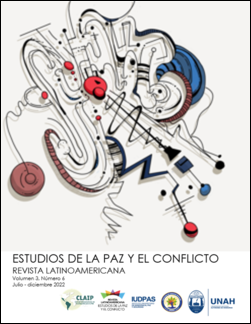Embodying the reality to be achieved: interview with Johan Galtung
The war in Ukraine highlights the need to enhance the culture of peace and conflict transformation in a synergistically satisfactory manner.
DOI:
https://doi.org/10.5377/rlpc.v3i6.14095Keywords:
Pandemic, authoritarianism, war, Ukraine, Positive Peace, Latin AmericaAbstract
Johan Vincent Galtung (Oslo, 1930) is one of the most influential and prolific scholars in the world: his intellectual output during the 1960s led to the birth and development of Peace and Conflict Studies. The multiple and relevant contributions made by the author were key in shaping the theoretical and methodological corpus of an incipient discipline that, after fifty years of work, has become an unavoidable reference for the construction of a dignified and equitable world for all. Galtung's broad academic production includes more than 100 books translated into dozens of languages and more than 1000 published articles. Johan studied mathematics and sociology. In 1959, he founded the first peace research institute of which he was the director for 10 years. In 1964 he founded the Journal of Peace Research and contributed to the establishment of the International Peace Research Association (IPRA). He has been a professor and researcher at numerous universities in five continents, has collaborated with the United Nations and mediated in numerous international conflicts. He is currently Head of Transcend Peace University, of which he is a founder, and part of the international scientific committee of this editorial project: the Latin American Journal of Peace and Conflict Studies (ReLaPaC). In 1987, he received the Alternative Nobel Prize, the Right Livelihood Award, and in 1993, the Gandhi Award. In this interview, we talked with Professor Galtung about the threats and opportunities for peacebuilding looming over the world in the wake of the emergence of the CODIV-19 pandemic, the rise of authoritarianism on a planetary scale, global warming and its impacts, and, of course, the recent invasion of Ukraine by a nuclear power. We also talked about the violence in Latin America, as well as the road to peace, which is made by walking.
Downloads
1345
HTML (Español (España)) 741
XML (Español (España)) 166
EPUB (Español (España)) 109
Downloads
Published
How to Cite
Issue
Section
License
Copyright (c) 2022 Latin American Journal of Peace and Conflict Studies

This work is licensed under a Creative Commons Attribution 4.0 International License.
The journal's contents are published under a Creative Commons Attribution 4.0 license (CC BY 4.0). This license allows third parties to share (copy and redistribute the material in any medium or format) and adapt (remix, transform and create from the material for any purpose, including commercial), as long as the authorship and first publication in this journal (Revista Latinoamericana Estudios de la Paz y el Conflicto, Universidad Nacional Autónoma de Honduras - Consejo Latinoamericano de Investigación para la Paz, DOI of the work) is acknowledged, a link to the license is provided and it is indicated if changes have been made to the original. The terms of the license are available online at http://creativecommons.org.




